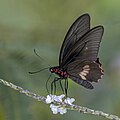Parides eurimedes
| Mylotes cattleheart | |
|---|---|

| |
| Male | |

| |
| male, P. e. mylotes, Costa Rica | |
| Scientific classification | |
| Domain: | Eukaryota |
| Kingdom: | Animalia |
| Phylum: | Arthropoda |
| Class: | Insecta |
| Order: | Lepidoptera |
| Family: | Papilionidae |
| Genus: | Parides |
| Species: | P. eurimedes
|
| Binomial name | |
| Parides eurimedes (Stoll, 1782)
| |
| Synonyms | |
| |
Parides eurimedes is a species of butterfly in the family Papilionidae. It is commonly known as the mylotes cattleheart, Arcas cattleheart, pink-checked cattleheart, and true cattleheart. It is native to the Americas.
Subspecies
[edit]In 2004, Gerardo Lamas combined Parides arcas and Parides timias into Parides eurimedes. He lists the following subspecies:[1]
- P. e. eurimedes (Stoll, 1782) (northern Colombia and northern Venezuela)[2][3]
- P. e. agathokles (Kollar, 1850) (Colombia)[2]
- P. e. antheas (Rothschild & Jordan, 1906) (Colombia)[2]
- P. e. arriphus (Boisduval, 1836) (central Colombia)[2]
- P. e. emilius Constantino, 1999 (western Colombia)[2]
- P. e. mycale (Godman & Salvin, 1890) (Panama to northern Colombia)[4]
- P. e. mylotes (H.W. Bates, 1861) (southern Mexico to Costa Rica)[5]
- P. e. timias (Gray, [1853]) (western Ecuador)[2][6]
-
male P. e. timias
Colombia -
male P. e. timias
Colombia -
male P. e. timias
Colombia -
male P. e. mycale
Panama
Description
[edit]The wingspan measures 7 to 8.5 cm (2.8 to 3.3 in). P. e. mylotes is black with both sexes having a red patch on the dorsal hindwing. The dorsal forewing of the male has a triangular green patch. The female has a white patch on the dorsal forewing.[7] A full description (as P. arcas and P.timias) is provided by Rothschild, W. and Jordan, K. (1906)[8]
Distribution and habitat
[edit]P. eurimedes is found in the Neotropical realm from Mexico to northern South America, where it is commonly found in tropical forests.[7][9]
Life cycle
[edit]The purple-brown caterpillar is spotted with black. A white lateral stripe is found on each side of the body. The chrysalis is pale yellow green.[7] Host plants include Aristolochia grandiflora, A. nummularfolia, A. odoratissima, A. pilosa, and A. tonduzii.[2]
Taxonomy
[edit]Parides eurimedes is a member of the aeneas species group[10]
The members are
- Parides aeneas
- Parides aglaope
- Parides burchellanus
- Parides echemon
- Parides eurimedes
- Parides lysander – Lysander cattleheart
- Parides neophilus – spear-winged cattleheart
- Parides orellana
- Parides panthonus – panthonus cattleheart
- Parides tros
- Parides zacynthus
References
[edit]- ^ "Parides arcas arcas". World Field Guide. Archived from the original on 10 February 2013. Retrieved 17 March 2012.
- ^ a b c d e f g Savela, Markku. "Parides eurimedes". funet.fi. Retrieved 14 December 2010.
- ^ Lewis, H. L., 1974 Butterflies of the World ISBN 0-245-52097-X Page 26, figure 1, female
- ^ Warren, A. D.; et al. (2010). "Parides eurimedes mycale". Butterflies of America. Retrieved 17 December 2010.
- ^ Warren, A. D.; et al. (2010). "Parides eurimedes mylotes". Butterflies of America. Retrieved 17 December 2010.
- ^ Lewis, H. L., 1974 Butterflies of the World ISBN 0-245-52097-X Page 26, figure 24, female
- ^ a b c Opler, Paul A.; Lotts, Kelly; Naberhaus, Thomas (2010). "Mylotes Cattle Heart Parides eurimedes (Stoll, 1782)". Butterflies and Moths of North America. Retrieved 17 December 2010.
- ^ Rothschild, W. and Jordan, K. (1906). A revision of the American Papilios. Novitates Zoologicae 13: 411-752. (Facsimile edition ed. P.H. Arnaud, 1967) and online
- ^ Collins, N. Mark; Morris, Michael G. (1985). "Parides eurimedes (Stoll, 1780)". Threatened Swallowtail Butterflies of the World: The IUCN Red Data Book. Gland & Cambridge: IUCN. p. 71. ISBN 978-2-88032-603-6 – via Biodiversity Heritage Library.
- ^ Edwin Möhn, 2007 Butterflies of the World, Part 26: Papilionidae XIII. Parides Verlag Goecke & Evers Verlag Goecke & Evers ISBN 9783937783277
Further reading
[edit]- Lamas, Gerardo (2004). Atlas of Neotropical Lepidoptera; Checklist: Part4A Hesperioidea–Papilionoidea. Gainesville, Florida: Scientific Publishers, Inc. p. 92. ISBN 0-945417-28-4.
- Glassberg, Jeffrey (2007). A Swift Guide to the Butterflies of Mexico and Central America. Sunstreak Books Inc. ISBN 978-1-4243-0915-3.




